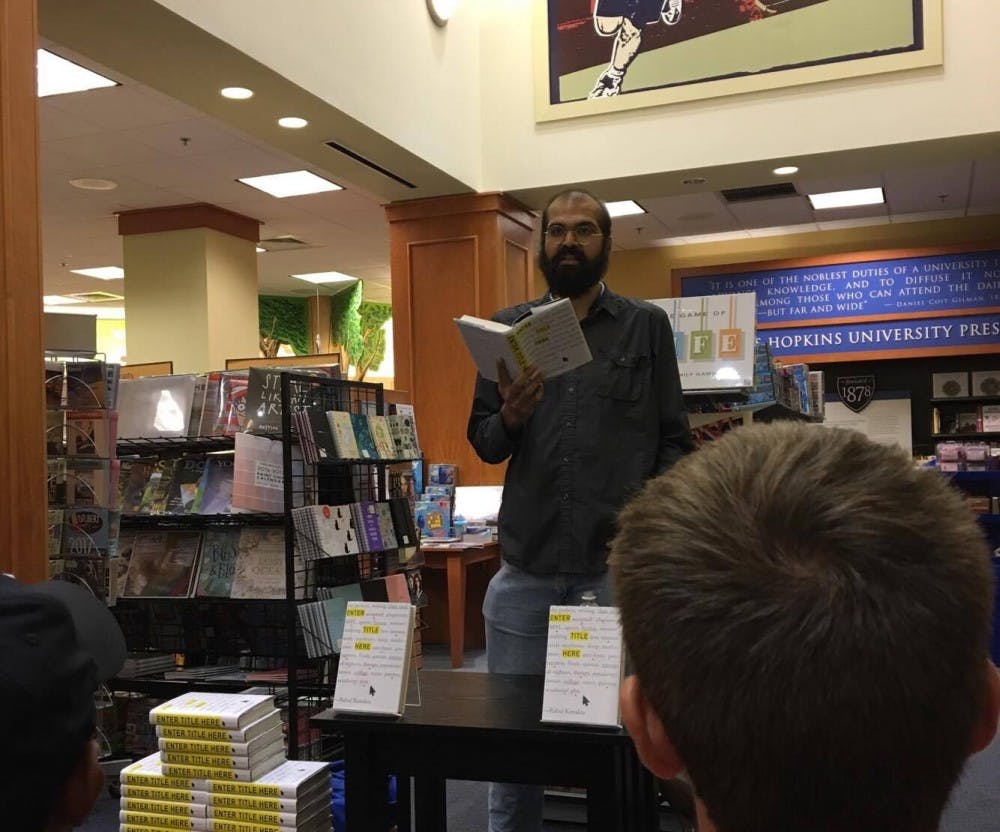Rahul Kanakia, a graduate from the University’s Master of Fine Arts (MFA) program, introduced his critically acclaimed debut novel, Enter Title Here, at Barnes & Noble on Tuesday night.
Enter Title Here is a young adult (YA) novel about Reshma Kapoor, a high school valedictorian who gets caught plagiarizing an assignment and loses her valedictorian title. She then embarks on a campaign of manipulation and backstabbing to win it back.
In an interview with The News-Letter, Kanakia shared what inspired his new novel.
“The idea came to me directly when I was reading this article about students in Korea who work very hard. These students were protesting and marching after a rash of suicides. They were chanting ‘we are not study machines,’” he said. “And I was thinking, what if I wrote about a dystopian world... where people have to study really really hard. But then I thought about it, and realized there is no need for that, that is our world for a lot of people.”
Since Reshma ultimately does not get accepted into her dream college, some reviewers commented that the novel was mocking ambitious young adults. Kanakia responded by speaking to the nature of ambition as it relates to young adults.
“I think most young people who work really hard honestly are primarily motivated by extrinsic rewards, like by accolades, honor and medals and getting into good colleges,” he said. “Ultimately that is not going to leave a person satisfied in life because each time you get a medal, you try to use it to prop up your self image and convince yourself that you’re smart and worthwhile.
“But that also means that you’re handing your self image to other people, so every time you don’t get something, it’ll mean the opposite: You are not smart, you are not worthwhile. And there will always be something more to get, there will always be failure in life. And people, young people especially often, end up giving up after one or two failures because they just think, ‘I am not cut out for this.’”
As a result, Kanakia proposed that motivation should come from an inner desire to achieve rather than from external influences. But at the same time, he acknowledged how difficult it is to ignore outside pressure.
“People should be motivated by intrinsic motivations by desire to learn, excel and do things, produce things. But we also have to be realistic, like I want to sell books and get acclaimed,” he said.
Kanakia shared his experiences while teaching at Hopkins and discussed the atmosphere of ambition at the college level, especially the idea that extrinsic rewards motivate hard work.
“It definitely applies to all colleges, it definitely applies to Hopkins as well,” he said. “When I was teaching here, I was extremely impressed by the students, and how smart they were, how hard working they were and how they excelled. So many of them would be such good writers. But come on, everybody here is pre-med. A lot of people here are pre-med because they interested in medicine, the human body and helping people. But, there is a reason why they are pre-med and not teachers, or nurses. It is a status thing. Doctors are high status, med school is hard to get into. You make a lot of money.”
Highlighting the medical profession, Kanakia spoke about how status influences career decisions.
“We all have a desire for status,” he said. “I think where it is not good is when people are doing things that they don’t enjoy on a daily basis just because it is high status.”
Kanakia elaborated on the specific fields that people gravitate towards because they are afraid of failing or want external confirmation of success. He noted that this makes writing a difficult and unconventional route for young adults.
“People who have succeeded in everything, are obviously very intelligent, fortunate and talented. But then, they often get channeled into safer careers because they are afraid of failure. It’s kind of perverse that you have a lot of really smart people who go and work in finance, that’s because you know how to apply a job in finance, like it’s an interview process that you can go through and if you succeed and tick all the boxes, then you’ll be a millionaire,” Kanakia said. “If you try to be an author, you know you’ll be rejected a few hundred times, even if you’re the greatest author.”
Kanakia said the MFA program at Hopkins played a major role in shaping and influencing his future work.
“I think [the MFA] had a really large impact,” he said. “I wrote science fiction then, and they were great. But when I came [here] and I saw the work that my classmates were doing, I started thinking a lot more about realist work and it really sparked my imagination. [Enter Title Here] I wrote during the winter break of my first year, and it was certainly the longest realist work that I had written.”
Freshman Faith Terry thought Reshma’s experiences during senior year were especially relatable for Hopkins students.
“I think it’s just how authentic the main character’s voice is. [Reshma] is like someone who a lot of Hopkins kids can relate to because we were all probably competitive in high school and so in that way,” she said.
Some reviewers of Enter Title Here found the novel to be uncomfortable, but Karen Hattrup, a YA author and member of the debut author group Sweet 16, had a different interpretation.
“I’d have to wait and find out. I think that it can be a good thing though, to feel a little bit uncomfortable,” Hattrup said. “We are probably seeing that more in YA these days and there is a lot of edgy, interesting stuff happening in YA fiction right now and this is probably an example of that.”





